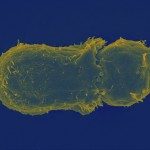Lien vers Pubmed [PMID] – 1347012
Eur. J. Immunol. 1992 Feb;22(2):405-12
We have studied the role of major histocompatibility complex (MHC) molecules in the regulation of intercellular adhesion of human B cells. We found that molecules able to bind to MHC class II molecules, such as monoclonal antibodies or staphylococcal enterotoxins, induced rapid and sustained homotypic adhesion of Epstein-Barr virus (EBV)-transformed B cell lines as well as peripheral blood B lymphocytes. Moreover, anti-MHC class I monoclonal antibodies also stimulated intercellular adherence. Adhesion induced upon MHC engagement was faster and stronger than that triggered by phorbol esters. It needed active metabolism, but divalent cations were not required. Monoclonal antibodies directed against LFA-1 (CD11a/CD18) or its ligand ICAM-1 (CD54) did not inhibit MHC class II-induced homotypic adhesion of various EBV-transformed B cell lines, nor of a variant of the B cell line Raji expressing very low LFA-1 surface levels. Moreover, EBV-transformed B cells from a severe lymphocyte adhesion deficiency patient, lacking surface CD11/CD18, also aggregated in response to anti-MHC class I or class II monoclonal antibodies. Together these data indicate that engagement of MHC molecules may transduce signals to B cells resulting in up-regulation of intercellular adhesion, via an LFA-1-independent mechanism. This may play a role in the stabilization of T cell/antigen-presenting cell conjugates at the moment of antigen recognition.

